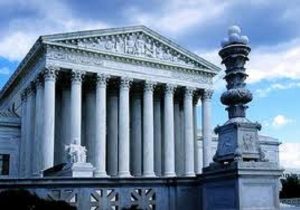'Fake Law': The Latest Effort To Delegitimize The Judiciary And The Constitution
Law professor's rant weaponizes a troubling trend.
 When “fake news” — a term coined to describe trolls writing satire pieces preying on the noxious cocktail of the ill-informed and hopelessly conspiratorial — was somehow recast as “liberal media bias” on steroids, we should have predicted that “fake X” would metastasize into a universal assault on the legitimacy of anything that doesn’t fit the White House narrative. It’s just too perfect an insult for an infantilized public craving a Manichaean reading of electoral politics. The news one doesn’t like to hear isn’t just “biased,” it’s “fake.” There isn’t a shred of truth being spun — it’s just a lie. Up is down, black is white, leveraged millionaires are billionaires. How couldn’t this assault on the legitimacy of reality itself not spread beyond the media?
When “fake news” — a term coined to describe trolls writing satire pieces preying on the noxious cocktail of the ill-informed and hopelessly conspiratorial — was somehow recast as “liberal media bias” on steroids, we should have predicted that “fake X” would metastasize into a universal assault on the legitimacy of anything that doesn’t fit the White House narrative. It’s just too perfect an insult for an infantilized public craving a Manichaean reading of electoral politics. The news one doesn’t like to hear isn’t just “biased,” it’s “fake.” There isn’t a shred of truth being spun — it’s just a lie. Up is down, black is white, leveraged millionaires are billionaires. How couldn’t this assault on the legitimacy of reality itself not spread beyond the media?
When judges from across the political spectrum started to consistently rule against Trump, the charge of “fake law” wouldn’t be too far behind, and sure enough it’s rolled into the station.
Weaponizing “fake” to delegitimize the American legal system is the whole point of Professor Marc O. DeGirolami’s new Weekly Standard article, a fusillade against the very gall of any federal judge that might question the conclusions of a president who issues proclamations with all the clarity that 140 characters allows.

Thomson Reuters' Claims Explorer: A Powerful Tool For Legal Claim Identification

These judges frustrating the Muslim travel ban? That’s fake. The judge who allowed the riot claim to proceed? That’s fake too. Presumably Judge Curiel is fake as well — and worse, a Mexican! — but we don’t get that far in this piece. Perhaps the sequel. In any event, everyone slighting the White House is creating “fake law” to serve the “resistance” to Trump.
Because when you think of W. appointees Judge James Robart and Judge Richard Clifton, I think “dirty hippies.”
But facts don’t really matter when the goal is to undermine the public’s faith in the judiciary.
In one recent deformation, Trump was sued for incitement to riot and assault and battery when, at a campaign rally before he became president, he said “Get ’em out of here” in response to protesters in the audience. Several of these protesters were subsequently pushed and struck by others in the crowd. A Kentucky federal district judge ruled that the case against Trump could proceed because “Get ’em out of here” could reasonably be interpreted as an exhortation to attack the protesters.
Sponsored
Law Firm Business Development Is More Than Relationship Building

Luxury, Lies, And A $10 Million Embezzlement

Thomson Reuters' Claims Explorer: A Powerful Tool For Legal Claim Identification


Curbing Client And Talent Loss With Productivity Tech
To DeGirolami’s credit, there was an element of “fake news” surrounding this story. Politico covered the story with the provocative headline “Trump lawyer: ‘No right’ to protest at rallies,” and the left side of the social media vortex went nuts on this apparent perversion of the First Amendment. The problem is, despite the clumsy drafting, the Trump argument on that point is sound. Campaigns really can exclude dissenters from their rallies, even if the rallies are held in a public space.
But DeGirolami takes his argument way beyond this:
The most astonishing part is the court’s conclusion that the statement is not protected by the speech clause of the First Amendment because it is plausible to think Trump was inciting a riot. Though the court cites the highly speech-protective test from Brandenburg v. Ohio, in which the Supreme Court held that the freedom of speech does not permit the government “to forbid or proscribe advocacy of the use of force or of law violation except where such advocacy is directed to inciting or producing imminent lawless action and is likely to incite or produce such action,” it mangles it. What part of “Get ’em out of here” could plausibly be interpreted as advocating illegal activity, rather than a call for the assistance of security officers? Where is the explicit advocacy of illegality?
This is shamefully misleading. Having seen hecklers removed from political events before many, many times, there’s a procedure and it absolutely doesn’t involve yelling to a crowd, “Get ’em out of here.” What part of that could be interpreted as advocating illegal activity rather than a call for the assistance of security officers? Hm…
https://www.youtube.com/watch?v=S3HUVIZQc-Q
Sponsored

Curbing Client And Talent Loss With Productivity Tech

Tackling Deposition Anxiety: How AI Is Changing The Way Lawyers Do Depositions
Oh right! The fact that he routinely told his crowds to physically assault protesters, which, at last check, was still imminent illegal activity. Indeed, Trump knew full well it was illegal activity which is why on many of these occasions he told the audience that he’d pay their legal bills.
DeGirolami surely knows better than to peddle this tripe. Yes, Brandenburg means Trump calling upon his followers to hate on people of color or even to assault liberals generally are protected statements. Telling a crowd to lay hands on people in the crowd at that very moment, however, is an invitation to illegal activity. At least enough of an invitation to survive the motion to dismiss stage which, as DeGirolami presumably knows, isn’t where courts generally kick claims based on factual assertions like “here’s what we think Trump meant when he said that thing that in all other cases he meant differently.”
And Judge Hale’s denial of the motion to dismiss makes exactly this point. The opinion also addresses the Brandenburg issue within the context of the pleadings. Here, I’ll even link to it. Alas, responding to Judge Hale’s precise reasoning was beyond the purview of a Weekly Standard article when calling him “fake” would suffice.
At the end of the day it’s not whether or not DeGirolami is right about the law (he’s not) but the character of his assault on the judiciary. When Neil Gorsuch told Senators that he found Trump’s attacks on the judiciary “disheartening” and “demoralizing,” he was right. It’s a fine thing to disagree with a legal interpretation. It’s even a fine thing to criticize a legal philosophy.
But that’s not what DeGirolami’s doing. He’s going before an ill-informed, non-lawyer audience and attacking the legitimacy and sanctity of the judicial system and using the veneer of authority he has as a law professor at St. John’s to press his claims.
Even if he doesn’t understand the baggage he’s brought into the discussion by invoking the “Fake X” construction, that doesn’t mean it’s not there for the audience. To the people he’s writing, it’s recognized shorthand for “institutional illegitimacy.” If a little less than half the country thinks the whole system is a sham, that’s not great news for America.
Law professors shouldn’t shepherd audiences to that conclusion.
Fake Law [The Weekly Standard]
Earlier: Trump’s Lawyers Are Probably Right: Campaigns Can Kick Out Protestors
 Joe Patrice is an editor at Above the Law and co-host of Thinking Like A Lawyer. Feel free to email any tips, questions, or comments. Follow him on Twitter if you’re interested in law, politics, and a healthy dose of college sports news.
Joe Patrice is an editor at Above the Law and co-host of Thinking Like A Lawyer. Feel free to email any tips, questions, or comments. Follow him on Twitter if you’re interested in law, politics, and a healthy dose of college sports news.







